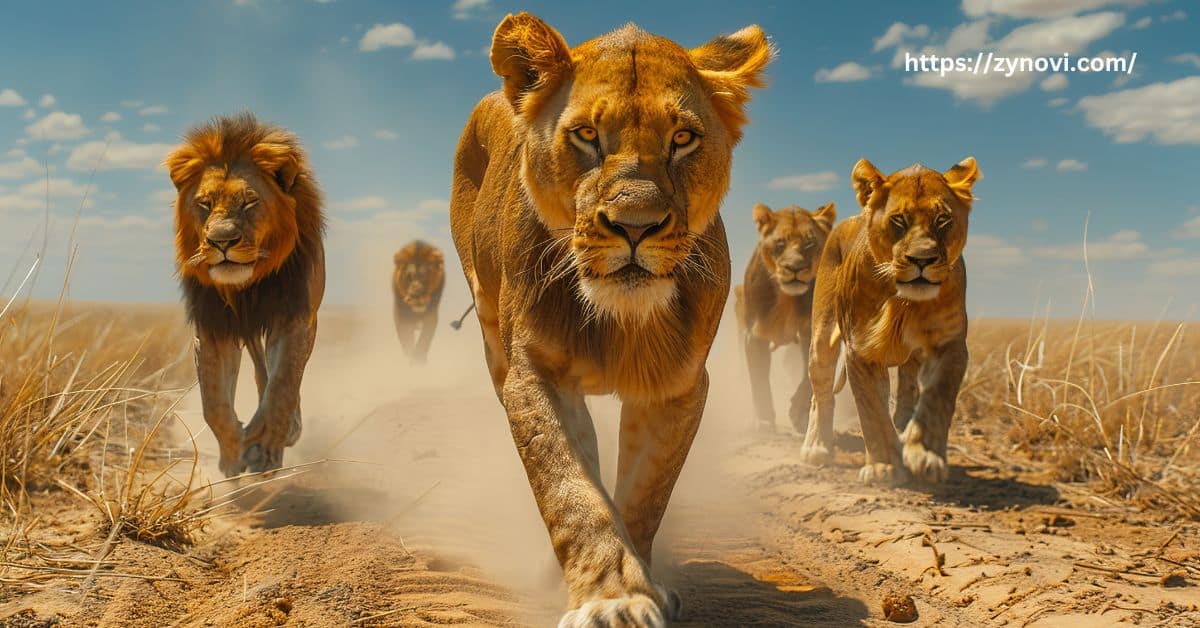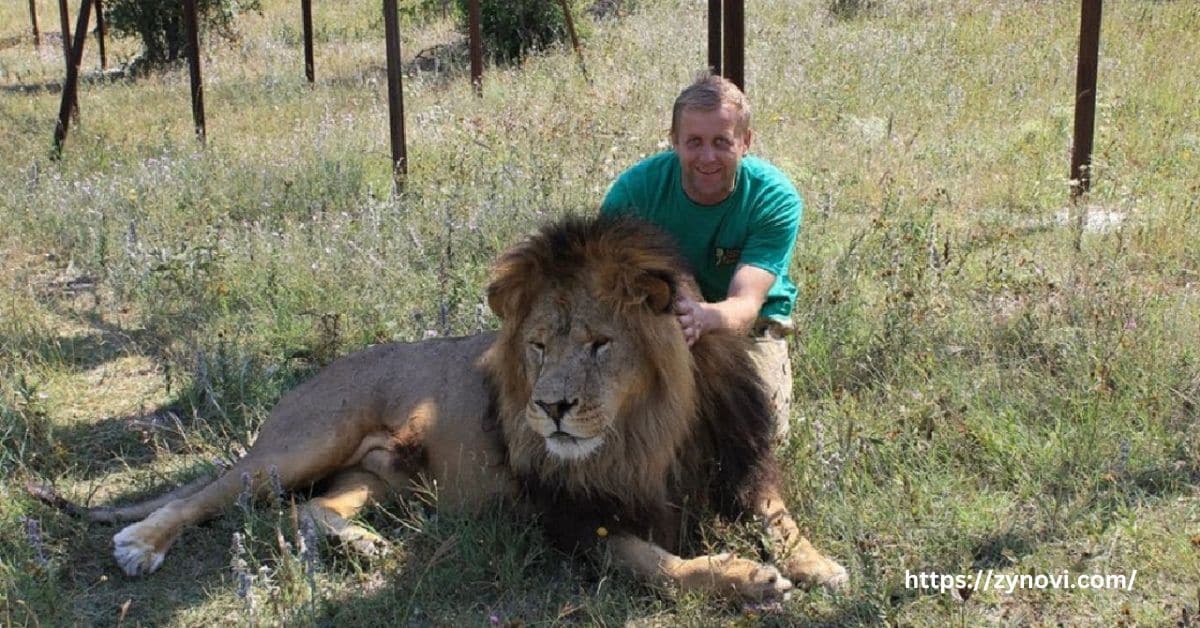Do Lions Attack Humans? Lions rarely attack humans, but incidents occur under specific conditions, like territorial defense or food scarcity.
It’s a question that sparks both curiosity and fear. As the majestic “king of the jungle,” lions are often portrayed as fierce and unpredictable. But how much of this is true? Are these powerful creatures really out to harm us, or are the stories we hear exaggerated?
In this article, we’ll dive into the real reasons behind lion attacks, the frequency of these encounters, and how you can stay safe while exploring their wild world. Whether you’re a wildlife enthusiast or just curious, you won’t want to miss the fascinating facts we’ve uncovered!
Understanding Lions: The King of the Jungle
Lions (Panthera leo) are the most social of all big cats, living in groups called prides. Lions, often referred to as the kings of the jungle, are majestic creatures revered and feared in equal measure
Lion Behavior and Social Structure
A typical pride consists of 10-15 members, including females, cubs, and a few males.
Female lions do most of the hunting, working collaboratively to bring down prey such as wildebeests, zebras, and buffalo.
Male lions, meanwhile, protect the pride’s territory, which can span 50 to 150 square miles.
Their territorial behavior often leads to conflicts, not only with other prides but also with humans who encroach upon their habitats.
Habitat and Distribution
Lions primarily inhabit sub-Saharan Africa, though a small population of Asiatic lions (Panthera leo persica) survives in India’s Gir Forest National Park.
Historical records show that lions once roamed North Africa, Europe, and Asia, but their range has drastically reduced due to human activities like deforestation and agriculture.
| Region | Lion Population |
|---|---|
| Sub-Saharan Africa | ~20,000 |
| Gir Forest, India | ~700 |
| Historical Range | Much of Africa, Asia |
Do Lions Attack Humans?

Documented Cases of Lion Attacks
Throughout history, lion attacks on humans have been both terrifying and fascinating, with numerous well-documented cases highlighting their rare but deadly nature.
One of the most infamous incidents involves the “Man-Eaters of Tsavo,” two male lions that terrorized railway workers in Kenya in 1898, reportedly killing over 130 people.
Such attacks often occur when lions are injured, old, or struggling to hunt their typical prey, forcing them to target easier alternatives like humans.
Are Lion Attacks Common?
Lion attacks on humans are relatively rare compared to other wildlife-related fatalities. Statistics indicate that lions are responsible for 250-300 human deaths annually worldwide, with most incidents reported in Tanzania, Mozambique, and Kenya.
To put this into perspective, crocodiles kill over 1,000 people each year, and hippos account for approximately 500 deaths annually.
While lions are apex predators, they typically avoid human interaction unless provoked, cornered, or struggling to find natural prey.
High-Risk Areas: Where Lion Attacks Occur
Lion attacks are most likely to happen in areas where human-wildlife conflict is high. Hotspots include:
Lion attacks are most common in regions where human activities overlap with lion habitats, leading to heightened human-wildlife conflict. High-risk areas include:
- Tanzania’s Selous Game Reserve: This vast reserve is home to a significant lion population, where encroaching human settlements and poaching activities increase the likelihood of encounters.
- Kenya’s Maasai Mara National Reserve: Known for its dense wildlife, this reserve sees occasional lion attacks, particularly near livestock-grazing areas bordering the park.
- Mozambique’s Limpopo National Park: Human encroachment and livestock grazing in this park create opportunities for lions to come into close contact with people, raising the risk of attacks.
Big Cats Compared: How Lions Rank in Danger
Lions are undoubtedly dangerous, but they are generally less aggressive toward humans compared to other big cats like tigers and leopards.
Tigers are notorious for deliberately stalking humans, particularly in areas like the Sundarbans, where man-eating behavior has been documented. On the other hand, leopards are more likely to venture into urban areas, leading to frequent human-wildlife conflicts.
Lions typically prefer to avoid human interactions unless provoked or desperate, whereas tigers and leopards exhibit more opportunistic and aggressive behaviors toward humans.
Why Do Lions Attack Humans?
Situational Triggers for Aggression
Lions generally avoid human interaction but can become aggressive in certain situations, including:
- Territorial Defense: Lions are highly territorial animals. If humans encroach on their territory or approach their pride, lions may perceive this as a direct threat and respond with aggression.
- Protecting Cubs: Female lions are particularly protective of their cubs. Any perceived danger near their young can trigger defensive and highly aggressive behavior to safeguard their offspring.
- Food Scarcity: During droughts or other environmental hardships, prey becomes scarce, forcing lions to hunt alternative food sources, including livestock or even humans.
Human Activities Contributing to Lion Attacks
Increasing human encroachment into lion habitats is a significant factor in rising lion attacks.
Activities such as agriculture, deforestation, and settlement expansion disrupt natural ecosystems, forcing lions into closer proximity with people.
Poaching also destabilizes prey populations, leaving lions with fewer options and increasing conflict.
Illness or Injury in Lions:
Injured or aging lions often target humans as easier prey. The infamous Man-Eaters of Tsavo were discovered to have severe dental issues, making it difficult to hunt their usual prey, which likely drove them to attack humans.
How Dangerous Are Lion Attacks?

Severity of Injuries in Lion Attacks
Severity of Injuries in Lion Attacks: A lion’s attack can result in severe, often life-threatening injuries due to the immense power in its jaws and claws.
With a bite force of over 650 pounds per square inch (psi), lions can easily crush bones and tear through flesh.
Survivors of lion attacks often require extensive medical intervention, including surgery to repair broken bones and tissue damage.
Many victims face long-term disabilities, such as paralysis or permanent scarring, due to the ferocity of the attack.
Lion Strength and Hunting Techniques
Lion Strength and Hunting Techniques: Lions are powerful ambush predators, known for their incredible strength and speed.
Capable of reaching speeds up to 50 mph in short bursts, they can quickly close the distance between themselves and their prey.
Their hunting strategy relies heavily on teamwork, with the pride working together to stalk and trap prey.
Using stealth and coordination, lions launch a deadly pounce to bring down animals much larger than themselves, making them some of the most formidable predators in the wild.
How to Stay Safe and Avoid Lion Attacks
Guidelines for Safari or Reserve Visitors
- Stay in Vehicles: The majority of lion attacks on safaris happen when visitors leave the safety of their vehicles. Staying inside the vehicle ensures a protective barrier and reduces the risk of a surprise encounter.
- Observe from a Distance: To stay safe, always maintain a distance of at least 100 meters from lions. This allows you to observe their behavior without provoking them, as lions may perceive close proximity as a threat.
- Follow Local Guides: Local safari guides are experts in wildlife behavior and know how to handle potentially dangerous situations. Always follow their instructions and stay close to them to ensure your safety during your visit.
Preventing Conflicts in Rural Communities
- Fencing: Installing electric fences around livestock areas is an effective way to keep lions from entering villages and hunting domestic animals. These fences act as a physical barrier, reducing human-lion interactions and preventing attacks.
- Lighting: Bright floodlights and other lighting systems can discourage lions from approaching human settlements. Lions are nocturnal hunters, and the installation of lights around villages makes it more difficult for them to navigate and hunt safely at night.
- Lion Guardians: Lion Guardians programs, such as those in Kenya, train local communities to safely manage lion populations and reduce human-wildlife conflict. These trained individuals help protect livestock, monitor lion movements, and work with conservationists to create safer environments for both humans and lions.
Emergency Actions During a Lion Encounter
Don’t Run: Running can provoke a lion’s predatory instincts, prompting it to chase you. It’s essential to stay calm and avoid sudden movements.
Stand Tall: Try to appear as large as possible by standing upright, making yourself look more imposing. This can sometimes discourage a lion from approaching.
Make Noise: Shouting, clapping, or using any loud noise can potentially scare off a lion. Lions are often wary of human activity and might retreat if they perceive you as a threat.
Are Lion Attacks on Humans Increasing?
The Role of Habitat Loss and Human Expansion
As human populations grow, more land is being developed for agriculture, infrastructure, and urbanization. This expansion leads to habitat loss, pushing lions into closer proximity with human settlements.
Over the last two decades, the rise of human settlements near wildlife reserves has doubled, which has resulted in increased human-wildlife conflict. Lions, having lost their natural territories, are more likely to come into contact with humans, escalating the risk of attacks.
Conservation Efforts and Their Impact
Conservation organizations, such as the African Wildlife Foundation, are taking vital steps to protect lions and their habitats. These programs focus on reducing human-wildlife conflict, enhancing community education, and supporting sustainable land-use practices.
By securing wildlife corridors and improving the relationship between local communities and wildlife, conservation efforts have helped stabilize lion populations.
Additionally, they have reduced the frequency of attacks by promoting coexistence through protective measures like fencing, wildlife monitoring, and anti-poaching initiatives.
FAQs
Do lions normally attack humans?
No, lion attacks on humans are rare and usually occur due to specific circumstances like hunger or territorial defense.
Will a lion attack you if it sees you?
Lions typically avoid humans, but if they feel threatened or cornered, they may become aggressive.
Are lions friendly to humans?
Lions are not naturally friendly to humans; they are wild predators and should be respected as such.
What to do if a lion approaches you?
Stay calm, make yourself appear larger, and slowly back away without turning your back on the lion.
Conclusion: Do Lions Attack Humans?
Lions are indeed powerful and skilled predators, but they are not naturally inclined to attack humans. Most lion attacks occur due to specific circumstances like territorial defense, protecting cubs, or food scarcity often exacerbated by human encroachment on their habitats.
By tackling the root causes of human-lion conflict, such as habitat loss, poaching, and environmental disruptions, we can work toward a safer coexistence. Conservation efforts, community education, and sustainable practices are crucial in maintaining the delicate balance between lion protection and human safety, ensuring a future where both can thrive in harmony.










